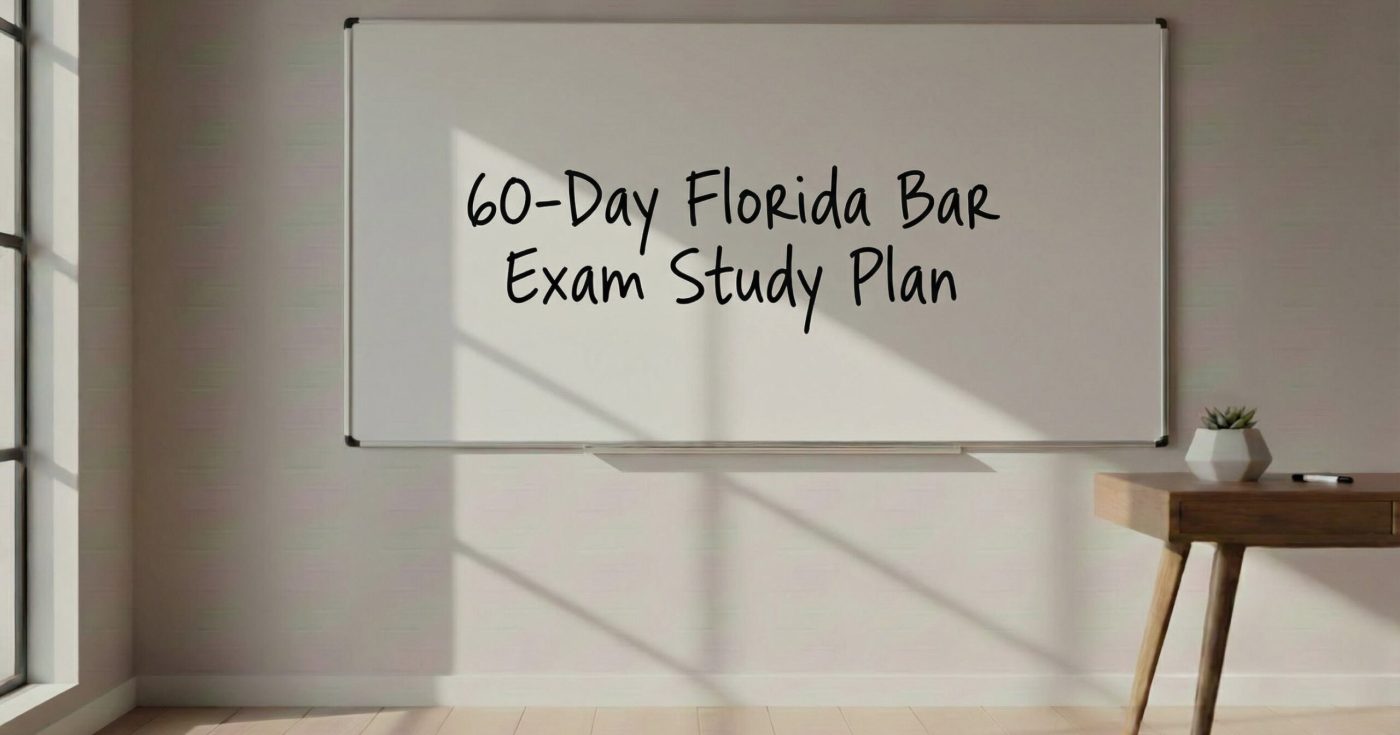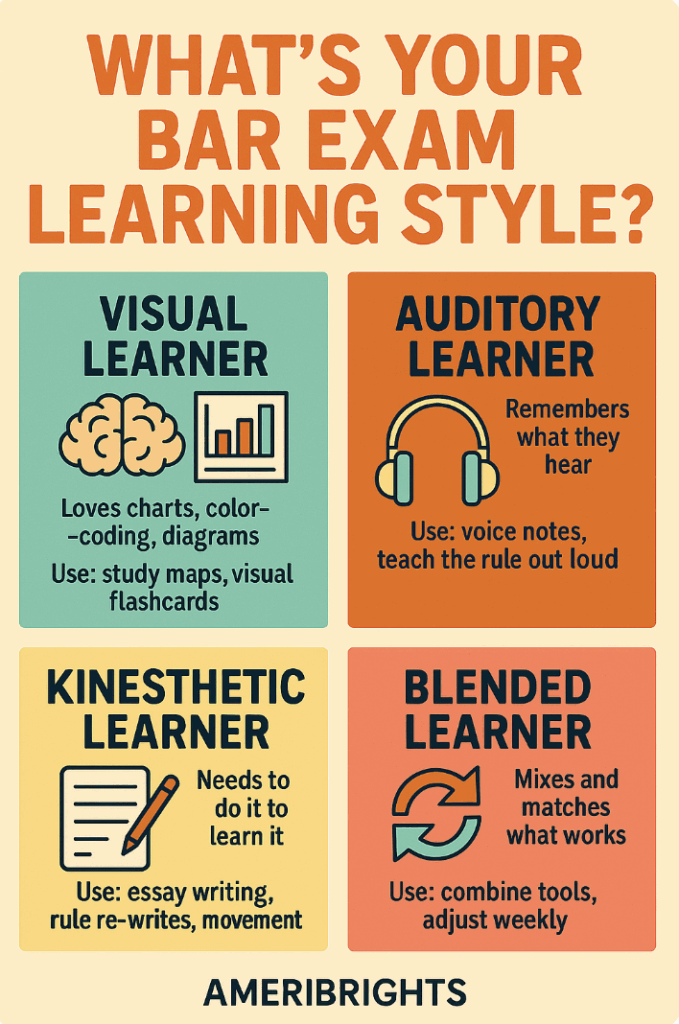How to Study for the FL Bar Exam in 60 Days

In this article
It’s May 1. You open your calendar and count the weeks. The bar exam is three months away. You haven’t started. You’re not enrolled in a big course. You’re wondering if that means you’re already behind—or if there’s still a way to do this your way.
Let’s be clear: you can absolutely pass the Florida Bar in 60 days without an expensive program or a 1,000-page outline. But you need a plan that’s focused, strategic, and tailored to how you learn best.
This guide breaks down how to use the time you have to study smarter—not longer. We’ll show you what Florida actually tests, how to lean into your strengths, what to skip, and how to build a study system that works even when time is tight.
Understand What Florida Actually Tests
Your best friend here is the Florida Board of Bar Examiners website—start there.
Florida’s bar exam is split into two parts: Part A (Florida-specific) and Part B (the MBE). You can think of Part A as being made up of six segments: three multiple-choice segments and three essay segments. Each segment is a separate part of the exam and generally focuses on a few related subjects grouped together.
Part B, the Multistate Bar Exam, is all multiple choice—200 questions total, with 175 graded. It covers standard federal subjects: Civil Procedure, Constitutional Law, Contracts, Criminal Law & Procedure, Evidence, Real Property, and Torts.
Part A is where Florida-specific law comes in. You’ll spend three hours on 100 multiple-choice questions, and another three hours writing three essays.
The multiple-choice portion always includes one segment covering the Florida Rules of Civil Procedure, Criminal Procedure, and Judicial Administration. The other two segments are drawn from a broader pool—subjects like Evidence, Wills & Trusts, Business Entities, Family Law, and UCC Articles 3 & 9. You won’t know what’s coming, but understanding the pattern helps you prep smarter.
Each essay counts as one segment and usually tests two to three subjects together. Think of something like Contracts/Torts/Ethics or Criminal Law and Constitutional Criminal Procedure. These combinations aren’t random—Florida essays are known for blending subjects, and spotting those intersections is half the battle.
Pro tip: Always study Ethics. If you can work it into an essay, do it—it’s often an easy point boost. And if the fact pattern raises a federal rule but you know there’s a Florida distinction, call it out. That’s the kind of detail that can separate a good answer from a great one.
Accept How You Learn Best—and Plan Accordingly
Not everyone learns the same way—and that’s a good thing. Some people are visual and remember rules better when they’re color-coded or laid out in charts. Others need to say things out loud, record themselves, or teach the material to someone else. And some only retain information by doing—writing essays, making flashcards by hand, or walking through hypotheticals. Most of us are a mix. The point is: don’t fight your learning style. If you know what works for you, lean into it. Build your 60-day plan around the methods that actually help you retain—not the ones that make you zone out. You don’t need to study harder. You need to study smarter, in a way that works for you.

Prioritize Florida’s Highly Tested Subjects
There are some subjects Florida always tests. Civ Pro, Crim Pro, and Judicial Admin—they’re guaranteed. You should never skip those.
Then there are subjects that show up a lot, even if they’re not guaranteed. Evidence, Wills, Trusts, UCC, and Business Entities come up often enough to matter. If you’re short on time, those are worth bumping up your list.
That said, I’m not saying you should only study what’s been tested most. But if you’re under pressure, it helps to know where the points tend to be.
Example? From 2013 to 2025:
- Alimony was tested at least 5 times.
- Equitable distribution showed up 3.
- In Real Property, homestead, foreclosure, and statute of frauds were each tested 4 times.
It’s not about guessing. It’s about being strategic with the time you have.
Practice Essays—Don’t Just Read Them
There’s really no excuse not to practice essays—Florida gives you all the past questions and actual student answers that passed. For free. You don’t need someone else to grade your work. Just write. Then compare.
Reading teaches structure. Writing teaches control. You need both.
Some students feel ready after writing just a few. Others need more practice to get comfortable spotting issues and organizing answers under time pressure. It depends on your strengths.
And if your essay doesn’t look like the one in the study guide? That’s okay. Those answers are strong, polished examples—but they’re not the only way to pass. Use them to learn how issues were spotted and rules were applied, not as a standard you have to copy.
The goal is clarity, not perfection.
Know the Florida-Specific Rules and Distinctions
Florida loves to test its own way of doing things—especially in areas like Evidence, Criminal Procedure, and Civil Procedure. These subjects aren’t just about knowing the federal rule. You need to know how Florida differs.
The best way to stay on top of this? Start a list. Keep track of every Florida-specific rule or distinction you come across. This list will become one of your most important tools as the exam gets closer.
If you don’t know where to begin, try searching Quizlet. A lot of students share flashcard decks for Florida-specific rules. Just make sure to double-check everything—some of those decks are outdated or flat-out wrong. Still, they can be a great starting point for building your own, more reliable version.
Bottom line: Don’t treat Florida distinctions as “bonus” info. On this exam, they’re often the difference between a passing and failing score.
Don’t Skip the MBE – Even Without A Course
Even if you’re not taking a full bar course, you absolutely need to do MBE practice questions. This isn’t optional. You don’t get better at multiple choice by reading outlines—you get better by answering, missing, and learning.
Here’s my take: aim to do at least 2,000 MBE questions. That’s a number I stand by. It gives you enough volume to build pattern recognition, spot weak spots, and sharpen your timing without burning out. Spread them out over your 60 days, and it’s totally doable.
My personal go-to for this is Adaptibar. It’s not flashy, but it works. You get real NCBE-released questions, a clean interface, and smart analytics that actually help you target the topics you’re struggling with. I like that it adjusts to how you’re performing, not just how many questions you’ve done.
Pro tip: Before you sign up, ask a friend who already has it for a referral code. You’ll get a discount, and they might too.
This isn’t about getting perfect scores — you need repetition, feedback, and actual practice with the format you’re going to see on test day.
Track and Memorize What You Keep Missing
You can’t fix what you’re not tracking. If you keep getting the same rules wrong—or blank on the same exceptions—you need to catch that early.
Start a “missed rules” list—in a doc, a spreadsheet, or even handwritten. Every time you miss a question, forget a rule, or misstate something in an essay, write it down. Then review that list consistently. It becomes one of the most effective tools in your prep.
I worked with a student this past year who is a kinesthetic learner—she learns best by physically writing things out. She rewrote every single rule she missed by hand. Honestly, I was worried it might slow her down. But it was just how her brain processed information. And it worked—she passed.
The point is: know your learning style. If writing helps you retain, lean into it. If repetition works better, review your list daily. Just make sure you’re tracking what slips through the cracks—because that’s the stuff that will cost you points if you don’t catch it.
Time Blocking
Let’s be real: Florida tests a ton of material. If you’re not mapping it out, it’s easy to over-focus on what you like—or worse, ignore whole subjects without meaning to.
Time blocking is how you stay in control. It’s not about creating a perfect schedule. It’s about deciding—ahead of time—when you’re reviewing which subject, what you’re practicing, and how you’re using your time.
You don’t need a fancy app. Just a plan. And we’ve made it easier:
Download our free weekly bar exam schedule planners to build a system that works around your life, not against it.
Make space for review, MBE practice, essays, breaks, and catch-up days. Even one week at a time, time blocking can seriously reduce stress and help you stay focused on what matters.
Put it into Practice
You don’t need a thousand-page outline. You don’t need a bar course. What you do need is a plan that plays to your strengths, respects your time, and keeps you moving forward—even when the clock is ticking.
Whether you have 60 days or 30, it’s still possible. You can pass this exam by being consistent, strategic, and honest about what works for you. Use what Florida gives you. Know what they actually test. Cut the noise—and get to work.
We’ve seen it done. You can do it too.
✅ Your 60-Day Takeaway Checklist
If you’re starting now—whether it’s 60 days out or less—here’s what to focus on:
✔️ Understand what Florida actually tests
→ Break down Part A and Part B, and study what’s actually on the exam—not what sounds important.
✔️ Figure out how you learn best—and build around that
→ Visual? Auditory? Kinesthetic? Don’t fight your style. Use it to your advantage.
✔️ Know the guaranteed subjects
→ FL Civ Pro, FL Crim Pro, and Judicial Admin are always tested. Don’t skip them.
✔️ Prioritize highly tested subjects if you’re short on time
→ Evidence, Wills & Trusts, UCC Articles 3 and 9, and Business Entities come up often.
✔️ Practice essays—don’t just read them
→ Florida gives you real questions and real answers. Use them. Write your own. Compare and improve.
✔️ Keep a running list of rules you miss
→ Use a doc, spreadsheet, or notebook to track mistakes. Review often.
✔️ Aim for 2,000 MBE questions
→ It’s a solid goal. Adaptibar is a great tool for this. And yes—ask a friend for a referral before signing up.
✔️ Time block your study schedule
→ Don’t just “try to study.” Plan your hours. Use our free weekly study planner to help you stay on track.
If you’re noticing the same rules and distinctions coming up again and again, having a structured study system to organize Florida law and MBE material can make review far more efficient — especially when time is limited.
More Florida Bar Exam Articles
- How to Prepare Last Minute: FL Bar Exam Tips
- How to Calculate Child Support: Florida Bar Exam
- Failed Florida Bar Exam (Part A): How to Prepare
- FL Bar Exam Evidence Privileges: What You Need to Know
- Most Tested Contracts Areas on FL Bar Exam: Part One
- Ace The Most Tested FL Constitutional Law Distinctions

